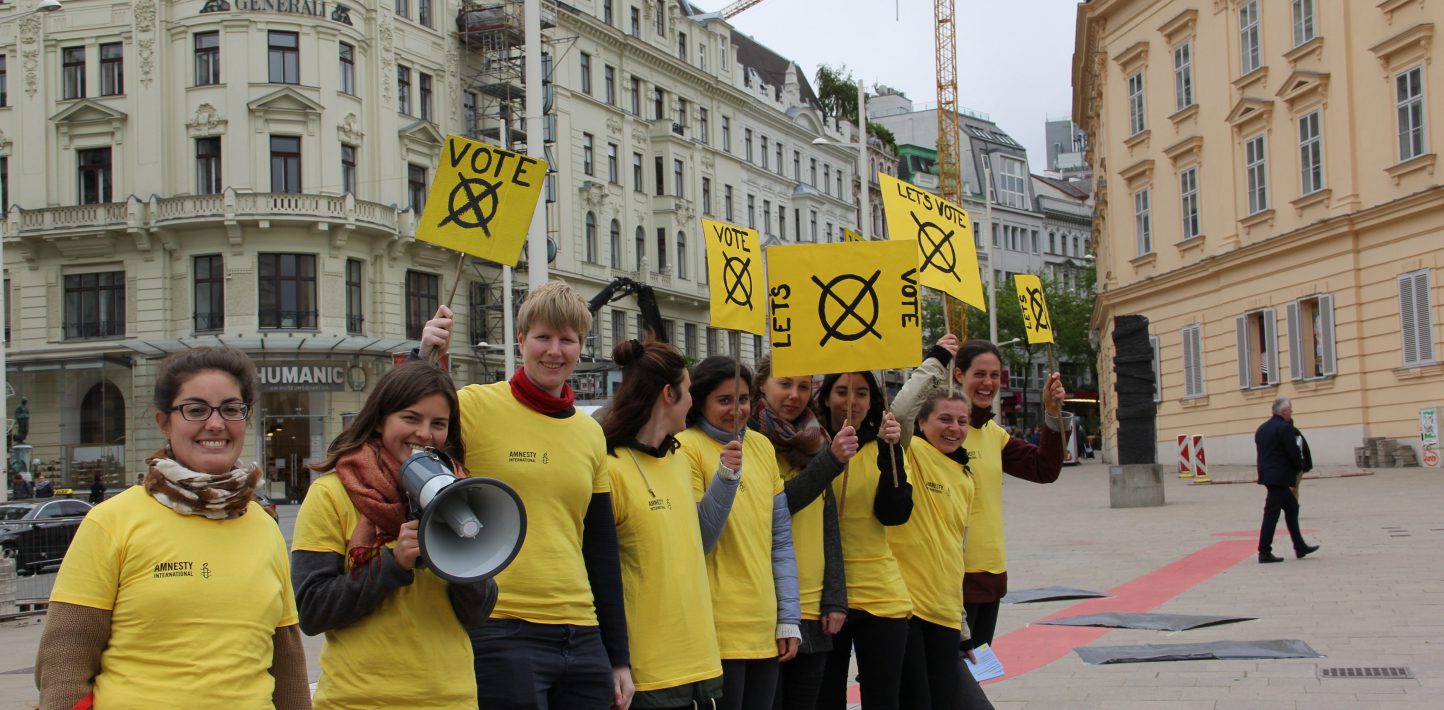by Eve Geddie, Director of Amnesty International’s European Institutions Office
First published on Euronews: https://bit.ly/2IkNebw
Despite all the challenges facing our newly elected MEPs I am hopeful that a freer, fairer Europe is in reach. In last week’s elections Europeans came out and voted in greater numbers than at any time in the last 20 years, and many campaigns were driven by young people who made their voices heard on several key issues.
On 14 May, youth activists supported by Amnesty International staged coordinated actions in more than 35 cities encouraging Europeans to get out and vote. These young people expressed their vision of a Europe that welcomes refugees and migrants, guarantees equal rights for everyone, and prioritises tackling the climate crisis. Many of our new MEPs stand by similar principles. I will make it my mission during the coming years to work with them, and with colleagues, activists and partners from different sectors to help make this vision a reality.
It will not be easy, and we must be prepared to listen to and respect those who do not share our views.While many citizens used their vote to call for a fair, free and equal Europe,others were rallied to the ballot boxes by cries that the economy and the political establishment have left them behind. Facing such a diverse group of elected officials, with many alternative visions for the future of Europe, we need to be prepared to engage, willing to listen, and to find common ground.
We should be more confident of our ability to engage, inspire, and mobilise our fellow Europeans and the MEPs they voted for.
Eve Geddie, Amnesty International
The EU is more than just a trading bloc; it is a values-based political union founded on the principles of freedom, human rights and the rule of law. Yet there is growing disunity on these key issues.
In Poland peaceful protesters are being pursued in court and some judges are being replaced by colleagues who are more supportive of the government’s agenda. In Hungary the government has taken much of the media under its control and the xenophobic language of hate filled the Prime Minister’s stump speech during this election campaign.
By creating scapegoats politicians distract from some of the very real issues facing our continent.The failure of leaders to take responsibility is nowhere more evident than on the issue of migration. People who mo veto Europe to seek safety or opportunity have been met with wire fences, racism and discrimination. This issue was key in many election debates, and MEPs face a number of immediate challenges. Thousands of people are currently trapped in appalling conditions on the Greek islands by the EU-Turkey deal. The EU continues to finance migration control arrangements with Libya, such as training the Libyan coastguard to intercept refugees and migrants at sea and return them to Libya, where they face horrifying abuses.
MEPs must be prepared for an informed and reasoned debate on migration. Europe needs along-term vision on migration governance which meets economic and demographic needs and respects human rights. Here, the UN Global Compact on Migration provides a solid framework. Welcomed by MEPs in 2018, it recognises that public engagement is key to ensuring policies and narratives that counteract xenophobia.
The EU’s increased influence on the world stage means that MEPs also have a key role to play in ensuring human rights, peace and security globally. To do this, they must protect and promote human rights and those who defend them.
The new European Parliament will have to closely monitor the human rights situation in EU member states and address threats to the founding principles of the EU. Of course, they cannot do this alone, and the new EU Parliament must actively engage the European Commission and the Council to ensure strong EU action through existing mechanisms such as infringement proceedings, the ‘Rule of Law framework’ and the use of Article 7 of the EU Treaty, as well as developing and using future mechanisms to address human rights challenges. A key role of MEPs is to hold the other institutions to account for their actions, or lack thereof.
To secure broader support for human rights, we must be more conscious of the need to listen and to understand. And we should be more confident of our ability to engage, inspire,and mobilise our fellow Europeans and the MEPs they voted for.
The people of Europe, including many Amnesty International youth activists, have raised their voice sand made their demands for fairer societies for all heard in these elections.This is an unstoppable force and the new European Parliament cannot fail to be inspired and motivated by them. I know I am.


